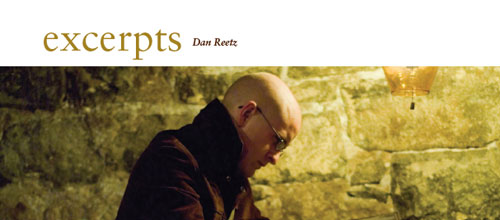
Dan Reetz, a 25-year-old guy with an undergraduate degree in art who recently spent a year teaching English in Russia, is now in his first year of a doctoral program in visual neuroscience at North Dakota State University. He grew up in Bismarck, N.D., and as high school drew to an end, he was thinking seriously about joining the U.S. Army when his art teacher urged him to consider college. He heard back from the school first, so that's what he did. His work has been exhibited and honored regionally and nationally.
Artists are constantly interacting with the visual system, and I think there's knowledge that they build up and explanations of things, like if you divide your composition this way it sort of magically becomes more interesting. I wanted to go the inverse way, which is to learn what we know about the visual system and I want to bring those things back to art.
When I was in the arts I was a bit too rational, maybe a bit demanding of logical explanations for things that spring from emotion and creativity, so I was a rational person among artists, and now I'm an artist among scientists.
I know my art is not always the most aesthetically pleasing. My art is very much commentary. My art has always had a very critical perspective.
One of the problems with a lot of art that I see today is that the artists very often reject technology and embrace traditional methods. I think it's the responsibility of artists to take advantage of this technology and leave it not only in the hands of the capitalist enterprise or whatever you'd like to call it, and to use those tools to create things that aren't motivated strictly to sell.
One turning point for me was that when I was a painter I had very good success selling paintings. I really enjoyed the cash flow, paid some tuition. That was a real joy, but I had attempted to instill them with a lot of critical discourse, and I found that the best paintings that I made, the most powerful thing they could do was compel somebody to purchase them. That was a moment where I decided that was not the way that I wanted to pursue art. It sort of gutted the critical perspective entirely.
Like a lot of artists I experiment in a lot of different media, but you could call me a digital artist.
Visual neuroscience, at least the portion of it that I'm immersed in, is concerned with what are the neural mechanisms of vision. How do we actually see the things we see. Vision is one of those things that seem so obvious and natural, but the fact is that the neuromechanisms of something as simple as perceiving the brightness of an object, just how much light we perceive reflecting off something, are not that well understood.
As a child I wanted to be three things, a cowboy, a football player and a scientist. The cowboy and football player parts thankfully went away and I feel really fortunate to be able to take part in the sciences.
After teaching for a year, I understand very well that I'm not meant to be a teacher. My students raved about me, but I don't understand how teachers can disconnect themselves from the success of their students at the end of the day. I've gained a lot of respect for teachers, and it really taught me to be a student again.
I don't know that I'd like to go on as a professor, but research and development is something I love and I'll pursue very narrow problems for perhaps unreasonable lengths of time.
I think that studying Russian over the year made me extremely sensitive to the fine points of language and especially watching non-native speakers construct sentences with very precise meanings and seeing that they were often more precise than I was. Coming back into the sciences, in my field, there's a very specific distinction between, for example, brightness and lightness. It's important to be precise and to say things in an interesting way so you're not boring everyone to death.
Corruption is a worldwide phenomenon. Some of the police in Russia are crooked, as they say, and I did pay bribes. There were situations in which a little money saved me a lot of hassle.
I know so many tremendously talented people who are sort of crippled by self-doubt or fear of rejection. I don't have that humble thing. I do feel very confident in my own abilities and I want that to come across.
If you're making art, it seems to me the spirit of it is to have as many people experience it as possible.

































